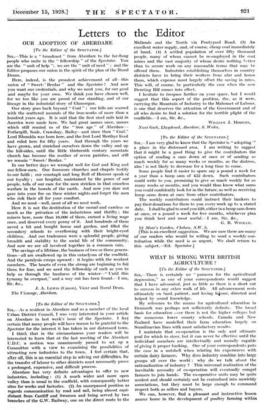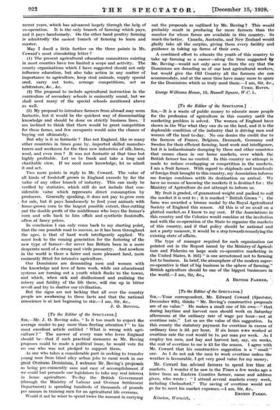WHAT IS WRONG WITH BRITISH AGRICULTURE ?
[To the Editor of the SPECTATOR.] SIR,—There is certainly no " panacea for the agricultural depression," as one of your correspondents would suggest that I have advocated, just as little as there is a short cut to success in any other walk of life. All advancement rests ultimately on hard, patient, and loving labour, directed and helped by sound knowledge.
My reference to the means for agricultural education in Denmark was perhaps not sufficiently definite. The broad basis for education over there is not the higher colleges but the numerous lower county schools. Canada and New Zealand have modelled their farm education largely on Scandinavian lines with most satisfactory results.
I maintain that co-operation is the only and ultimate goal for which to steer, but it can never be effective until the individual members are intellectually and morally capable of giving it proper backing. One of your correspondents puts the case in a nutshell when relating his experiences with certain dairy farmers. Why does industry combine into large groups all over the world ; why do we talk about the rationalization of industry ? This universal realization of the inevitable necessity of co-operation will eventually compel farmers to join hands. The co-operative units may be quite modest and should certainly not be centralized into unwieldy associations, but they must be large enough to command respect both as sellers and buyers.
We can, however, find a pleasant and instructive lesson nearer home in the development of poultry farming within recent years, -which has advanced largely through the help of co-operation. It is the only branch of farming' which pays, and it pays handsomely-. On the other hand poultry farming is• admittedly-the easiest -branch of farming: to learn and master. - - • May I dwell a little further on the three points in Mr.
Coward's most stimulating letter ? • - (1) The•present agricultural education committees existing in most counties have too limited a scope and activity. The county organizations which I have suggested should not only influence education, but also take action in any matter of importance to agriculture, keep stud animals, supply special seed, carry out tests, arrange competitions, act as arbitrators,-&c., &c.
(2) The proposal to include agricultural instruction in the curriculum of secondary schools is eminently sound, but we shall need many of the special schools mentioned above' as well.
(3) My proposal to introduce farmers from abroad may seem fantastic, but it would be the quickest way of disseminating knowledge and should be done on strictly business lines. 'I am inclined to think that there would be great -competition for these farms, and few occupants would miss the chance of buying out ultimately.
But why is it so fantastic ? Has not England, like so many other countries in times gone by, imported skilled manufac- turers and workmen for the then new industries of silk, linen, wool, and even iron ? It was not fantastic at that time but highly profitable. Let us be frank and take a long and charitable view. If we need more knowledge, let us admit it and act.
Two more points in reply to Mr. Coward. The value of all kinds of foodstuff grown in England exceeds by far the value of any other branch of industry. This can easily be verified by statistics, which still do not include that con- siderable value which represents direct consumption by prOducers. Generally speaking, it does not pay to grow corn for sale, but it pays handsomely to feed your animals with home-grown 'corn to the largest possible extent, thus cutting out the double profit of the middleman who buys the farmer's corn and sells back to him offals and synthetic foodstuffs, often at fancy prices.
In conclusion I can only come back to my starting point, that the one possible road to success, as it has been throughout the ages, is that of hard work intelligently applied. We must look to the coming generation for the fostering of the new type of fanner—for never has Britain been in a more desperate need of a strong and virile peasantry. And nowhere in the world is there a fairer and more pleasant land, more eminently fitted for intensive agriculture. - Our Dominions are demanding men and women with the knowledge and love of farm work, while our educational systems are turning out a youth which flocks 'to the towns, and which, when sick and disillusioned and realizing the misery and futility of the life there, will rise up in bitter revolt and try to shatter our civilization.
But the signs are not lacking that all over the country people are awakening to these facts and that the national conscience is at last beginning to stir.—I am, Sir, &c.,
J. 0. BOVING.









































 Previous page
Previous page